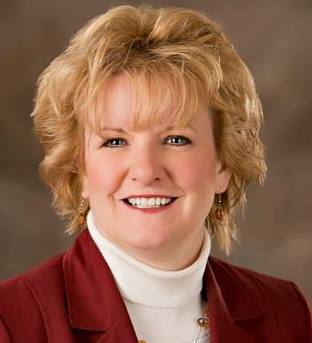
A Manhattan-based nonprofit is deeply concerned with moves the federal government is making with healthcare.
Big Lakes Developmental Center, Inc, began in 1973 and serves individuals with intellectual and developmental disabilities in Riley, Geary, Clay and Pottawatomie counties. Its director, Lori Feldkamp, told Riley County commissioners Monday during her 2018 appropriation request that last week’s passage of the American Health Care Act in the U.S. House of Representatives could be detrimental to Big Lakes if it ever becomes law.
“That bill, as it stands right now, cuts almost a trillion dollars out of Medicaid,” Feldkamp said. “And there are absolutely no protections for people with disabilities, as it stands right now.”

Feldkamp
According to financial documents provided by Big Lakes through the county’s website, over 89 percent of Big Lakes funding is obtained through federal, state, and county tax entities. Medicaid is the primary source — 94 percent — of direct service funding through the Home and Community Based Service Waiver for the intellectual and developmentally disabled under the umbrella of the 1935 Social Security Act.
The Republican bill aimed at repealing and replacing Obamacare was pulled at the last minute before a vote in March. The Congressional Budget Office estimated it would reduce federal deficits by $337 billion over the coming decade and increase the number of people who are uninsured by 24 million in 2026 relative to Obamacare as it exists today. A reworked version of the bill passed the House on May 3 without a review by the CBO, so no estimates on costs or coverage rates are known with the version headed to the Senate.
Because of that, Feldkamp told the commission such uncertainty has been difficult in Big Lakes’ budget process.
“That’s something that’s out there that also gives me a lot of heartburn when it comes to budgeting,” she said. “Because I have no idea in how quickly that would all come about, too.”
Big Lakes, which employs 244 people and provides care for 220 adults and children with intellectual and developmental disabilities, is asking for $213,000 from the county for 2018 — the same amount it has received from the county the past two years.
It was appropriated $208,901 in 2015 and $198,953 in 2014. Big Lakes is expecting a budget deficit of $583,117 for 2018.
For Feldkamp, the fight to strengthen Big Lakes’ services is a two-front endeavor. Although the state legislature sent a bill to Gov. Sam Brownback’s desk to expand Medicaid in Kansas — which would’ve benefited Big Lakes and similar services in the state — it was vetoed and an override attempt failed.
Feldkamp told commissioners she traveled to Topeka in March to advocate for a 5-percent increase from the Kansas Department for Aging and Disability Services as the state continues crafting its 2018 budget. She said it was adopted as part of the Senate budget, but admitted she wasn’t confident that would be the case before July 1, when a state budget is due.
But her top concern is at the federal level. She told commissioners she reached out Friday to Republican Senators Jerry Moran and Pat Roberts.
“My understanding from Sen. Moran’s office is that they’re going to be completely rewriting things, because they didn’t have good budget estimates on the House side, so that’s going to be a pretty big deal,” she told the board.
“They’re looking at going at a per capita cap (with Medicaid). And what that means is that it passes that (funding) responsibility on to states, if there’s any kind of increase in the number of population that you’re going to serve and it increases costs, that falls to the state to make up those differences.”
Pawnee Mental Health Services in Manhattan is another nonprofit organization and its director, Robbin Cole, was also in the Commission Chambers Monday afternoon for her appropriation request. She also expressed funding worries.
“At times it’s easy to take a look at Pawnee as being somewhat of a miracle worker, for being able to do some of the things that we do with all the budget cuts that we’ve experienced,” she said. “But as you can see, last year, we had a revenue budget of a little over $11.6 million. Our expenses however, were $12.1 million.”
The demand for these services is high in the state.
Feldkamp said the waiting list for individuals with intellectual and developmental disabilities has grown to 3,689 state-wide and 141 for Big Lakes alone — or to look it another way, an 8-year wait, according to Feldkamp. Both figures increased from last year’s waiting list.
“It’s a shame,” commission chairman Ron Wells told Feldkamp. “I couldn’t’ believe that waiting list is so long. I don’t know how some of those people hold out.”
Still, Feldkamp cautioned commissioners that the AHCA bill still has a journey ahead of it before it would become law.
“There’s a lot of things going on right now that cause me a lot of pause,” she said. “But, it’s not final yet. The best we can do is contact our legislators and our congressmen and let them know what kind of effects these kinds of things would have on their local communities.”
County commissioners have a few more rounds of budget and appropriation requests to hear before it moves forward in the budget process.
Preliminary budgets will be distributed to the board on May 18 and revenue estimates will be given to commission by May 19.
A public hearing for the budget will by on July 10 before it goes to the commission for approval by mid-August.
The post Big Lakes director says AHCA bill could cut trillions from Medicaid appeared first on News Radio KMAN.

